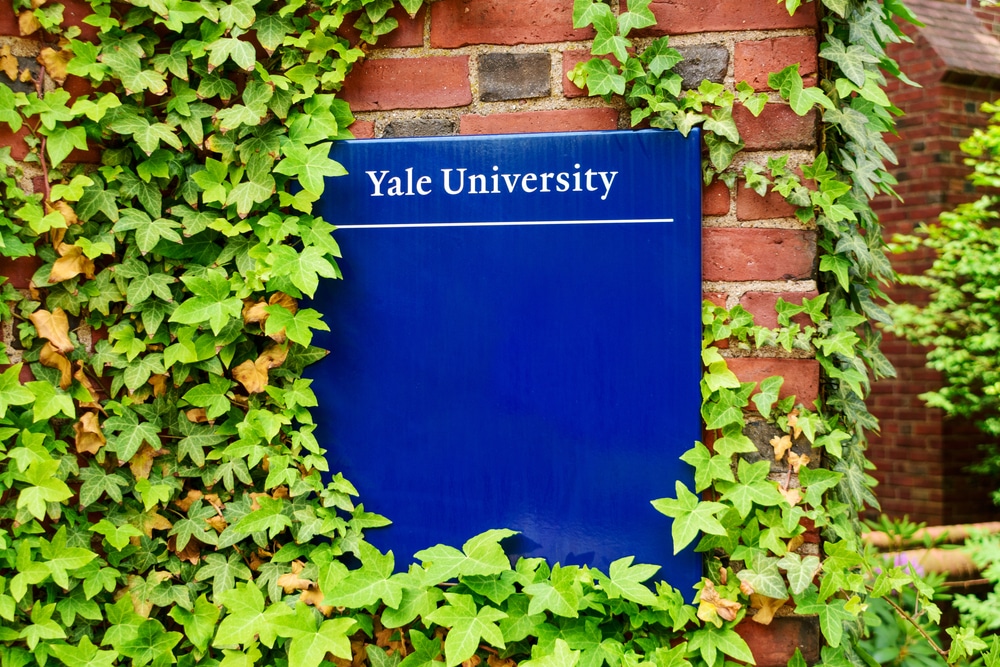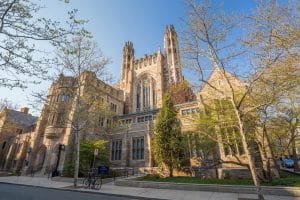When was Yale Founded?
When was Yale founded? Yale was initially founded for ministerial education, rooted in the “An Act for Liberty to Erect a Collegiate School” sanctioned by Connecticut’s General Court on October 9, 1701. Shortly after, ten Congregationalist ministers, all Harvard alumni (the sole North American college during their youth), converged in Branford, Connecticut. They amalgamated their book collections, earning the collective title “The Founders.”
Initially, this educational institution called the Collegiate School, settled in Abraham Pierson’s home in what’s now Clinton. Subsequent relocations took it to Saybrook, then Wethersfield, and finally in 1718, to its longstanding location in New Haven.
Around this time, a rift formed at Harvard, instigated by its sixth president, Increase Mather. He felt that the Harvard clergy were straying from strict religious orthodoxy. Post his tenure, the tension heightened, with his son, Cotton Mather, being overlooked for Harvard’s presidency twice. This drove the Mathers to bolster the Collegiate School.

In 1718, Cotton Mather approached Elihu Yale, a wealthy businessman from Wales, for financial aid for a new college building. Yale, enriched by his tenure with the East India Company, made generous contributions. His sizable donation led Cotton Mather to suggest renaming the institution “Yale College” in gratitude, hoping for more patronage. While Elihu Yale learned of the renaming during a trip to India, which he never concluded, his intended bequest to the school went unclaimed.
Notably, Hebrew was a significant academic focus, especially in New England, as it enabled direct engagement with the Old Testament. President Ezra Stiles, a strong proponent of Hebrew studies, introduced it to freshmen and incorporated Hebrew terms into Yale’s emblem. However, during his term in 1779, Yale faced potential demolition by British invaders, only to be saved by Yale alumnus Edmund Fanning, who served the British General then.
The subsequent years saw Yale diversifying its educational offerings: Medicine (1810), Divinity (1822, born from concerns over Harvard Divinity’s perceived liberal shift), Law (1843), Graduate School of Arts and Sciences (1847), Sheffield Scientific School (1861), and Fine Arts (1861). These expansions paralleled the Oxford-Cambridge schism.
By 1887, its breadth necessitated renaming “Yale College” to “Yale University.” More schools were introduced: Music (1894), Forestry and Environmental Studies (1901), Public Health (1915), Nursing (1923), Physician Associate Program (1973), and Management (1976). The partnership with the Sheffield Scientific School also evolved.
What is Yale Known for?
Since its founding, Yale University has become one of the most prestigious educational institutions in the world. Many may recognize Yale as an Ivy League institution or for its outstanding music and theatre programs. Yet beyond its prestigious reputation, Yale is a real place where students invest four years of their lives.
Yale University consistently ranks among the top 10 universities in the nation. Compared to their peers at Harvard, most Yale students tend to have a heightened academic focus.
Those who demonstrate a profound connection with an academic issue outside of the context of regular coursework are seen positively by Yale as compared to students who demonstrate a strong commitment to the community, leadership, and other success measures. For instance, a great applicant might be associated with an LGBTQ+ club at their school, but they might also have written an opinion piece for a local newspaper about recent discoveries in the sociology of gender.
It is commonly believed that among the colleges known as HYPSM (Harvard, Yale, Princeton, Stanford, and MIT), Yale is the institution that is the most receptive to students who have achieved substantial success in the arts. If you have remarkable skills in the areas of art, music, dance, or film, you should seriously consider including an arts supplement in your application to highlight your achievements.
The teaching staff at Yale is made up of some of the most eminent authorities in their respective professions (including the upcoming recipient of the Nobel Prize in Literature, Louise Glück).
The Social Sciences, Biological and Biomedical Sciences, History, Engineering, Mathematics, and Statistics are Yale’s most popular areas of study for undergraduate students. Since Yale was founded, in line with the tradition of liberal arts, Yale doesn’t offer minors.
Instead, Yale does provide a number of specialized departments and majors for students whose academic pursuits do not align with the school’s traditional departments. Students have the option to pursue a multidisciplinary program, an advanced language certificate, an interdisciplinary certificate, or a skill-based certificate. These include the following:
- The Special Divisional Major is an option for students interested in academic study that is distinct from other major programs (usually interdisciplinary).
- Multidisciplinary Academic Programs, sometimes known as MAPs, are a collection of majors that are offered in multidisciplinary subjects, including the following:
The Field of Education Studies
- Energy Studies
- Studies on the Health of the World
Research Concerning Human Rights
- The Bachelor’s and Master’s Degree Programs in Music, Public Health, and Forestry and Environmental Studies at Yale University each take a total of five years to complete.
In addition, Yale has its own summer study abroad program called Yale Summer Session Programs Abroad. In this program, Yale professors teach courses that can be taken for Yale credit and cover a wide range of topics.
Extracurricular Activities
Students at Yale should be prepared to devote a significant amount of their time to studying given the high academic standards of the institution.
Students who are smart enough to survive those expectations will find ways to relieve their stress and establish friends with students in other classes. To our good fortune, Yale offers a great deal of scope for precisely such endeavors. Some of the more soothing activities include participating in one of the many knitting clubs, in which participants sit in a circle and knit while chatting with one another.
The members of these groups are able to either engage in a creative exchange with one another (this is especially beneficial when knitting takes place during class time) or simply take pleasure in spending time with one another. Students have several opportunities to participate in this reassuring new interest as the university is home to several clubs that offer similar activities.
For those who are more interested in writing, there is a long-running literary magazine at the institution called Kalliope. Students who intern at Kalliope get the opportunity to study some of the most contemporary and innovative fiction and poetry, and they also have the chance to read and publish some of the works that will one day be taught in literary classes.
Despite the fact that Yale is better known for its academics than its athletics, the Yale Bulldogs, the school’s varsity sports teams, have won a total of 29 NCAA team championships. This includes 21 team championships in men’s golf, 4 team championships in men’s swimming, 2 team championships in women’s fencing, 1 team championship in men’s hockey, and 1 team championship in men’s lacrosse.
Traditions
Since its founding in 1701, Yale has been one of the oldest and most prestigious educational institutions in the world; thus, the university is home to a number of customs that have stood the test of time.
“The Game” is the name of one of the oldest traditions that Yale has. On the football field, Ivy League rivals Yale and Harvard have squared off against one another every year since the year 1875. Yale now holds the lead in the competition with an overall record of 68-61-8, although this just serves to fuel the rivalry between the institutions.
The Day of Service is a tradition at Yale that encourages students to begin their time at the university with a focus on volunteering and giving back to the community.
The Day of Service is an event that is organized by Dwight Hall that sends first-year students out into the New Haven community to perform volunteer work wherever it is needed. Students are reminded that their academic pursuits do not insulate them from the rest of the world by participating in a program that forges connections between the institution and the surrounding community.
Class Day is a tradition at Yale that dates back to the 19th century and serves as an opportunity for alumni to reflect on their time spent at the university. Every year, the graduating class gets together for a ceremony where they give speeches, hand out awards, and reflect on their past experiences as well as look forward to their futures.
In the 21st century, Class Day is celebrated on the same day as the Sunday commencement ceremony. Although attendees still sing “Bright College Years,” renowned guests such as Hilary Rodham Clinton and author Chimamanda Adichie are now invited to speak at the event.
What Majors is Yale Known for?
Since it was founded, Yale University has provided a select range of primary programs for its accepted students.
Yale offers over eighty distinct majors, two thousand diverse courses, and a unique trajectory tailored to each student’s chosen field of study. With a student-to-teacher ratio of 6 to 1, it boasts one of the smallest such ratios. Here are some of Yale’s most renowned majors.
Economics
While at Yale, it’s almost a given that you’ll overhear conversations about economics due to its popularity. Don’t be deterred by the notion that some advanced courses might be challenging. The Yale economics program has an impressive track record of producing highly successful graduates.
Political Science – Liberal Arts and Government
Where does public interest intersect with the law, and vice versa? How can goals be achieved while adhering to legal norms? Delving into these multifaceted topics is part and parcel of Yale’s political science major.
MCB – CDB (Molecular and Cell Biology – Cell and Developmental Bio)
Beyond the complexities of life itself, studying biology at Yale is an evolving journey. The department offers bio majors a rich array of resources, including research opportunities, faculty symposiums, luncheons, lab work, and much more. Plus, it sets a strong foundation for those eyeing medical school.
Psychology
Among Yale’s most fascinating and thought-provoking majors is psychology, which also enjoys immense popularity. Each class stands out in its intrigue. While professors might seem strict in lectures, their office hours reveal a different side, offering insights and guidance to succeed.
Global Affairs
There’s a prevailing notion among some students that global studies is a “light” major, implying fewer rigorous courses. Regardless of such perceptions, it’s undeniably engaging, urging students to think deeply about global issues. From economics to politics and societal matters, it’s a vast domain with much to explore.
American Studies
Delving into multiple aspects of modern American culture and its shaping forces, American Studies is a major that accentuates themes of change and continuity. Some programs might even offer enriching museum trips. Though it may not have the largest enrollment, it remains a captivating field of study.
Want to know more about how Yale was founded? Or do you need help putting the finishing touches on your college applications? At AdmissionSight, we have over 10 years of experience guiding students through the competitive admissions process.
AdmissionSight can help you put your best foot forward when applying to college this fall. Contact us today for more information on our services.








































